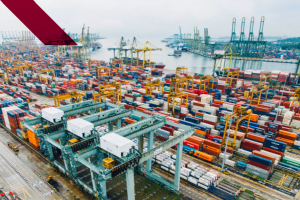Post/Colonial Cities: Place and Nonplace in the Ecotone
24-26 October 2019, Montreal (Canada)
After conferences in Montpellier, Poitiers and La Réunion (France, 2015, 2016 and 2018), as well as Kolkata (India, 2018) and Purchase (NY, USA, 2019), this is the 6th opus of this conference cycle in Montreal, Concordia University. An “ecotone” initially designates a transitional area between two ecosystems, for example between land and sea. The “Ecotones” program (2015-2020) is a cycle of conferences which aims to borrow this term traditionally used in geography and ecology and to broaden the concept by applying it to other disciplines in the social sciences and the humanities. An “ecotone” can thus also be understood as a cultural space of encounters, conflicts, and renewal between several communities. This interdisciplinary conference will more specifically focus on colonial and postcolonial port cities as ecotonic dialectics between places and non-places.
Commonly understood, a port is the site where ships’ passengers enter or exit, and cargo is loaded or unloaded. Thus, it represents the flow of people and exchange of goods, in the age of sail, as well as in the contemporary globalized world. The unbounded space of the port offers opportunities to explore “discontinuous histories” of port cities, and “its interfaces with the wider world” (Gilroy 1993), as a site that decentres the nation through its slippery flows. In addition, port cities anchor urban development around shipping routes and international trade. Ports of call offer the hope of safe harbours for migrants, a refuge in a storm, or alternatively a vulnerable site for colonial concessions or gateways that must be regulated or controlled. Ports are also passages of communications. In computer networking, a port is a nodal point of communication through which data flows, a portal to information. Lastly port cities occupy that liminal space between land and water, an in-between ecotonic zone of transition.
Ports are often referred to as nonplaces – gateways subject to global forces that historically shaped trans-oceanic connections, expansion into hinterlands, and crossroads of historical and contemporary encounters. Nonplaces within cities are commonly perceived as liminal locations reduced to their function of transportation or commercial nodes, or as locations that crush the sense of individual empowerment. But artists, writers, critics and researchers have depicted them as multiple, paradoxical spaces, where new possibilities arise and new cultures emerge. Nonplaces may produce social flows and networks that are not only a defining feature of our “super-modernity”, but also, in the longue durée of urban and semi-urban dynamics, a matrix for identity formation, cultural transitions and environmental adaptation.
Port cities, however, are also placed. Cities such as Georgetown in Guyana, Shanghai, Dar es Salaam, Liverpool, Calcutta, Nantes, or Montreal among many others, may be viewed through longstanding geographic imaginaries, linguistic collectivities and/or colonial and postcolonial histories, suggesting an ongoing struggle over who ‘claims’ the city (in Montreal’s case, unceded territory), and gestures towards political, social, or economic insecurities apparent in the spatial configurations of urban life, with implications that potentially destabilize national narratives. For example, as an island in the Saint Lawrence River, the city of Montreal is not only connected to multiple elsewheres through migration, but also through trade. The Saint Lawrence opens on to the Atlantic ocean through which flowed a long-standing trade in bauxite from towns in the Caribbean to Quebec (following circuits laid by imperialism). Thus, ports shape material channels of profit and power, as well as modes of resistance that occur around these networks of control.
ECHOES Colleague Cristiano Gianolla will be presenting the paper “Intercultural dynamics in post-colonial European ecotones, Lisbon and Copenhagen” co-authored by him and Astrid Nonbo Andersen
Full programme of the conference can be found here

